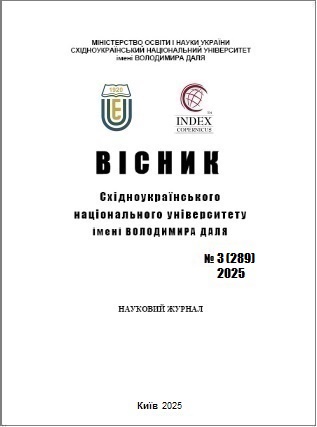Approaches to forming an effective marketing process in innovation-oriented enterprises
DOI:
https://doi.org/10.33216/1998-7927-2025-289-3-130-141Keywords:
marketing process, innovation-oriented enterprises, stages of formation, marketing strategy, marketing tools, personalized communications, methods, models, efficiency, features of the marketing processAbstract
Forming an effective marketing process in innovation-oriented enterprises is necessary for adapting to market changes, promoting innovative products, increasing competitiveness, optimizing resources, and strengthening customer loyalty, which ensures sustainable development, profitability, and leadership positions of the enterprise in the industry. The article aims to develop scientifically based approaches to the formation and improvement of the marketing process for innovation-oriented enterprises. To achieve this goal, the stages of the formation of the marketing process for innovation-oriented enterprises were developed, as well as measures for the research and implementation of each stage were worked out in detail. The article proposes a scheme for the marketing strategy development process, which is formed through the integration of the traditional marketing mix complex and additional components, such as "People," "Processes," and "Physical Evidence," which provide a positive customer experience and increase trust in innovations. Personalized communications and effective methods of demand forecasting, product portfolio planning, and marketing strategy development, taking into account their characteristics, are identified. A comparative analysis of the main models, their features, advantages, and disadvantages was conducted, and the specifics of innovative enterprises were determined. It was concluded that the marketing process in innovation-oriented enterprises has specific features due to the emphasis on developing unique products, technological innovations, and rapid response to changing market conditions. It is based on studying consumer needs, forecasting trends, and using innovative marketing tools, including digital technologies, for effective interaction with target audiences. Such enterprises are characterized by the active use of non-standard approaches, such as crowdsourcing, open innovations and partnerships, which allow optimizing costs and accelerating the entry of products into the market. A key component is the focus on long-term relationships with customers through the creation of added value, personalized services, and loyalty programs, which contribute to the retention of consumers and the formation of their trust.
References
1. Асланян О.І. Аналіз впливу інноваційної діяльності на конкурентоспроможність підприємств. DOI: https://doi.org/10.32782/2224-6282/189-9 (дата звернення 11.12.2024).
2. Крисюк Л., Москвіченко І., Майорова І., Цинюй Ш. Вплив інновацій на конкурентоспроможність підприємств портової галузі. DOI: https://doi.org/10.35774/ econa2021.01.152 (дата звернення 11.12.2024).
3. Найчук-Хрущ М. Б., Коновалець О.В. Маркетингові інновації як інструмент активізації інноваційної діяльності підприємств малого та середнього бізнесу. DOI: https://doi.org/10.32782/2524-0072/2024-59-15 (дата звернення 11.12.2024).
4. Холодний Г. О. Сучасні особливості та протиріччя інноваційного маркетингу. DOI: https://doi.org/10.32983/2222-0712-2023-2-190-197 (дата звернення 11.12.2024).
5. Обіход С.В., Матвеєв М.Е., Бойко В.Д. Digital-маркетинг в умовах цифровізації сучасних бізнес-процесів. DOI: https://doi.org/10.32782/ 2524-0072/2023-50-76 (дата звернення 12.12.2024).
6. Носань Н. С. Інноваційні маркетингові стратегії сучасного українського підприємства. DOI: https://doi.org/10.32782/2524-0072/2024-59-106
7. Томашевський Ю. М., Проскура В. Ф. Цифровий маркетинг: стратегії та інструменти для успішного онлайн-просування. DOI: https://doi.org/10.32680/2409-9260-2024-1-2-314-315-154-160 (дата звернення 14.12.2024).
8. Далик В. Продеус О., Федорига З., Бабій С. Формування стратегії цифрового маркетингу в умовах висококонкурентного середовища. DOI: http://dx.doi.org/10.5281/zenodo.7952329 (дата звернення 14.12.2024).
9. Пивавар І. В., Пономаренко О. О., Лісна І. Ф. Методика оцінки ефективності маркетингової діяльності підприємства. DOI: https://doi.org/10.32983/2222-4459-2019-9-345-354 (дата звернення 12.12.2024).
10. Герасимяк Н.В., Ковальчук О.В., Даценко В.В. Методичний підхід до оцінювання ефективності маркетингового забезпечення діяльності підприємства. DOI: https://doi.org/10.32782/2524-0072/2018-19-50 (дата звернення 14.12.2024).
11. Орлова-Курилова О. В., Сафронська І. М., Турчіна С.Г., Мартин О. М. Адаптивний розвиток маркетингової підсистеми інноваційно орієнтованих підприємств агропродовольчої сфери в контексті глобалізації, управління змінами та проєктами. Український журнал прикладної економіки та техніки. ЗНУ. 2023. №3. С.57-63. DOI: https://doi.org/10.36887/2415-8453-2023-3-8 (дата звернення 20.12.2024).
12. Ілляшенко С.М., Рудь М. П. Маркетингові інновації в інноваційній діяльності підприємств України. Ефективна економіка. №6 2017. URL:http://www.economy.nayka.com.ua/?op=1&z=5626 (дата звернення 20.12.2024).
13. Бандурка Л.О. Особливості використання гнучких методологій у маркетингу. URL:http://dspace.wunu.edu.ua/bitstream/316497/37832/1/29.pdf (дата звернення 26.12.2024).
14. Слав’юк Р. А., Гуйдаш Х. А. Диверсифікація каналів реалізації продукції підприємства в системі заходів забезпечення економічної ефективності. DOI: https://doi.org/10.52058/ 2786-5274-2022-7(9)-178-186 (дата звернення 26.12.2024).

